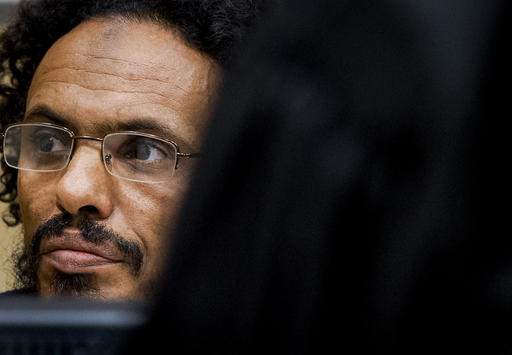-
Tips for becoming a good boxer - November 6, 2020
-
7 expert tips for making your hens night a memorable one - November 6, 2020
-
5 reasons to host your Christmas party on a cruise boat - November 6, 2020
-
What to do when you’re charged with a crime - November 6, 2020
-
Should you get one or multiple dogs? Here’s all you need to know - November 3, 2020
-
A Guide: How to Build Your Very Own Magic Mirror - February 14, 2019
-
Our Top Inspirational Baseball Stars - November 24, 2018
-
Five Tech Tools That Will Help You Turn Your Blog into a Business - November 24, 2018
-
How to Indulge on Vacation without Expanding Your Waist - November 9, 2018
-
5 Strategies for Businesses to Appeal to Today’s Increasingly Mobile-Crazed Customers - November 9, 2018
Extremist pleads guilty to destruction of historic Timbuktu mausoleums
A Malian jihadist chose to plead guilty, Monday, August 22, before the International Criminal Court in The Hague (ICC), the destruction of mausoleums classified as World Heritage of Humanity in Timbuktu.
Advertisement
Archaeologists hope, in light of the prevalent war on art, that the trial will send a hard-hitting message to groups that wrecking culturally cherished artefacts will not go unpunished.
The group destroyed nine Timbuktu mausoleums and also a famous mosque called Sidi Yahya using pickaxes and chisels following the siege of the city in April 2012.
Founded in the fifth century, Timbuktu rose to prominence in the 15th and 16th centuries as a center of Islamic learning and helped the spread of Islam across Africa.
Who’s going to get prosecuted for doing that?
“I am really sorry, I am really remorseful, and I regret all the damage that my actions have caused”, Mahdi said following his guilty plea. One year later, he was transferred to the ICC by authorities in Niger.
“The heritage of mankind was ransacked”, ICC chief prosecutor Fatou Bensouda told the court. “This must be stopped in its tracks”.
UNESCO renews also its full support to the people and government of Mali, and in particular to the local communities of Timbuktu, who have shown vast courage and determination to rebuild their Heritage, with the support of the global community.
In the build-up to the hearing, she compared the attacks to Islamic State’s smashing of monuments in the Syrian city of Palmyra and the Taliban’s 2001 destruction of the Bamiyan Buddha statues in Afghanistan.
Mr. Al Mahdi, a member of Ansar Dine, was directly involved in the entities established by the armed groups Al-Qaeda in the Islamic Maghreb (AQIM) and Ansar Dine during the occupation of Timbuktu in 2012, the Prosecutor said.
Mahdi has been described as a quiet Quranic scholar who turned ruthless jihadist enforcer, fiercely imposing the strictest interpretation of Sharia law.
“The ethnic cleansers in the Balkans, like the jihadis in Iraq, Syria, and Timbuktu and other places, are keenly aware of the significance of this, which is why they devote so much personnel and resources to the destruction of religious and cultural landmarks”, Riedlmayer said.
“It draws our attention to an increasingly worrying trend of deliberate destruction of cultural heritage in situations of armed conflict”, said the statement, which also noted that “such attacks represent a callous assault on the dignity and identity of entire populations and their religious and historical roots”.
“It was a period in time that was one of destructive rage”.
Worse, he says, such attacks “should be seen as a signal of serious persecution to follow”, since they are often “precursors to crimes against humanity such as ethnic cleansing”.
Earlier, prosecution lawyer Gilles Dutertre said Al Mahdi played “a key role” in the 2012 destruction and urged judges to sentence him to between nine and 11 years in prison.
Advertisement
The judges recognised this, but also warned al-Mahdi that they were not necessarily bound by the deal and he faced a maximum term of 20 years.





























